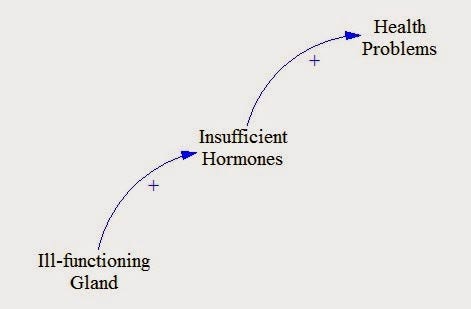Are we being hooked on drugs? a systemic analysis approach
The human body is an adaptive machine, where what is not strictly necessary, can be phased out. The permanent intake of drugs that replace, for example, hormones produced insufficiently by the body may not only make up for the defect, but it may be helping to make this defect even larger.
I have a good friend who has taken thyroid hormone supplements for over 20 years. Some months ago, an x-ray of this friend’s thyroid gland showed a severe grand atrophy (reduction) to about 25% of its normal size. I decided to take a look at this problem with a systemic outlook.
Systemic definition
The health problems that are caused by a deficient hormone level in the body, which is in turn caused by an ill-functioning thyroid gland, can be represented as follows in terms of the System Dynamics methodology:

These have a positive relationship since the higher the hormone insufficiency, the higher the health problems, all else being equal. In the same way, the more ill-functioning the thyroid gland, the higher the expected hormone insufficiency.
For this condition, the accepted intervention is to reduce the hormone insufficiency through a drug that would allow the body to restore the hormone levels it requires. This creates a balancing loop, as indicated in the following picture:

This can be confirmed through the following thought experiment, and simply by following the arrows and considering the polarities of the relationships between variables (positive or negative): The higher the hormone insufficiency, the more health problems that are experienced, which in turn leads to a higher drug supplement intake. Finally, the higher drug supplement intake leads to a reduced hormone deficiency, closing the loop and counteracting our initial condition (Hormone Insufficiency Level).
Side effects of Drug supplement Intake
My next question was then, “Ok, the immediate effect of the drug is indeed the reduction of the hormone gap in the body." "Are there any other effects that lead to dependence on the supplement drug?” This effect can be explored through the casual link between the drug supplement intake and the state of the ill-functioning gland, as shown in the following picture:

Hypothesis:
What if a side effect of the drug supplement intake in this case is leading to an ever-increasing amount of gland malfunctioning? If this were the case, then the process of drug intake would create a reinforcing loop through its effect on the underlying problem, namely an ill-functioning gland. In other words, the presence of increased levels of hormones in the body despite an ill-functioning thyroid gland (increased levels resulting from the drug supplement intake) could be signaling to the body that the gland is in fact not required, and the body, being an effective system, would then slowly reduce the gland size.
This would indeed explain the small thyroid gland size detected in my friend.
In a short period of research, I have not found any documents in regard to the effect of increased hormone levels in the body on an ill-functioning gland. I have, however, come across several examples of bodily adaptations that denote efficiency in body disposition.
- How does an increased level of hormones affect the development of an ill-functioning endocrine Gland?
- Are there any techniques which aim at the recuperation of Gland function?
- What are the economic incentives that would promote the search for Gland recuperation instead of drug consumption?
Nevertheless, System Dynamics has allowed me to take a very interesting first look at this problem.
